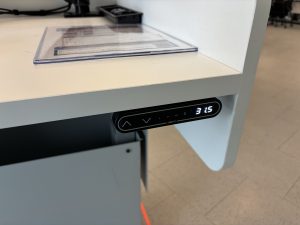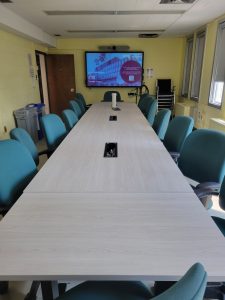36 Spaces and Environments
Accessibility and Disability Inclusion Initiatives in Athletics & Recreation
Athletics & Recreation has implemented several initiatives to improve accessibility and disability inclusion, including the Women on Weights program and the Adults with Disabilities Assisted Physical Training (ADAPT) Program to provide inclusive fitness opportunities. Camp programs offer one-on-one support for children with disabilities at no additional cost to families, and accessible sports for children 6 to 16 years old, in partnership with ParaSport Ontario. A&R provides all equipment for campers to participate in a multisport showcase, wheelchair basketball and sledge ball hockey. A&R has sport wheelchairs available for member use, and the climbing wall and Alpine Tower are both outfitted with accessible equipment.
Contributors: Athletics & Recreation (Keenan Jeppesen)
Accessibility in Heritage Sites: Evaluating Barriers in Historic Buildings at McMaster and Six Nations
Within a project intended to investigate accessibility in heritage buildings, the research team of Prof. Samir Chidiac surveyed two of the six McMaster buildings designated as heritage, University Hall and Hamilton, and two heritage buildings representing First Nations in Canada, specifically at Six Nations of the Grand River, Chiefswood National Historic Site and Christ Church and Her Majesty’s Chapel Royal of the Mohawk National Historic Site of Canada. A report was prepared to illuminate the barriers to accessibility aligning with the Canadian Standards Association B651-23 standard for accessible design. Additionally, a questionnaire survey was crafted to evaluate the accessibility of buildings at McMaster University from the perspective of students with different types of disabilities. This project is still in progress and the data is being collected in collaboration with Student Accessibility Services (SAS) at McMaster University.
Contributors: Prof. Chidiac’s Research Laboratory (Dr. Mouna Reda, Ms. Dhwani Rao, Department of Civil Engineering)
Enhancing Accessibility at the Faculty of Social Sciences
The Faculty of Social Sciences has a long-term commitment to improving accessibility standards in a variety of areas and continues to make incremental progress in several areas each year. Beyond the academic disciplines in Social Sciences, who directly engage in the praxis of disability and inclusion efforts, our operational teams have been hard at work aligning our values with our practices. This work is a continuation of work that has been going on in Social Sciences for over a decade with a particular focus on improving the built environment in teaching and learning spaces and addressing the integrated communication standards as they relate to our website properties. These efforts are collective, and the departments work collaboratively to implement these standards.


Contributors: Faculty of Social Sciences
Implementing an Accessibility Checklist for Inclusive Museum Exhibitions
Implemented an Accessibility Checklist for Exhibitions at the McMaster Museum of Art, formalizing the process for providing a framework for considering accessibility for events and tours, and exhibition-related materials such as large format text, alt-text on visuals, captions on videos, and an email contact for requesting further accommodations.
Contributors: McMaster Museum (Elyse Vickers, Nicole Knibb, Teresa Gregorio)
